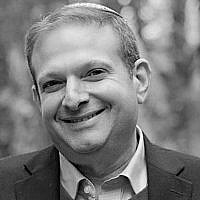Purim(s): The battles we wage

This week, I was sent a series of essays by a colleague. The volume — authored by a collection of progressive activists — attempts to “rewrite” the ninth chapter of the book of Esther. (The Shalom Center, Chapter 9 Project). Some of the authors sought to sanitize the megillah of its “more problematic elements.”
To remind us, the ninth chapter tells the story of the war of the Jews against their enemies, in which many are killed (75,000 in the provinces and 800 in the capital) and the children of Haman are hanged in the street, clearly meant as a deterrent towards further violence against Jews. The megillah even reports that when the Jews assume power, and Mordechai becomes prime minister, the king gives the Jews explicit permission to utterly destroy those who would seek their harm, “even women and children.” That seems like a recipe for genocide.
The motivation for this publication at this time is abundantly clear. The editor, Rabbi Arthur Waskow, incredibly compares the murderous killing of innocent Muslim worshipers in the Ma’arat HaMachpela (The Cave of the Patriarchs) by Baruch Goldstein in 1994 with the recent military operation into Gaza. Completely ignoring the present context and that the event was universally condemned (including by me in an editorial in the Yeshiva University newspaper when I was a student there), he looks at the present war as a war of vengeance, exacting an intolerable price on the population. At least in his first intro, he seems to see a direct line from a singular religious zealot to the entire nation, an entire regime. (He seems to ignore the many peace accords attempted in the intervening years.) Given this disposition, Rabbi Waskow seems to imply that this is the story of the ninth chapter as well, and that we need to create a new ending to the story.
The volume continues with a series of essays imagining “what could have been,” all having to do with the radical transformation of the hearts in one way or another. In one essay, Esther tells the people not to exact vengeance (although the megillah does not use that word but “defense”) because “vengeance will beget vengeance.” In another essay, the author imagines Mordechai convincing Achashverosh to recall all arms (and of course, the people freely disarm and after amassing all these arms he is not tempted to use them!). In yet another essay, Mordechai is tempted by the same power that warped Haman, and it is Esther who convinces him not to give in to his worst instincts.
What is disturbing about some of these essays is not some of the peace-loving idealistic sentiments. Indeed, our personal and traumatic histories carry the potential for rage, violence and even revenge, but also contains the seeds of post traumatic growth, the capacity to not repeat the past. As someone who yearns for a more sacred world, a world in which our collective divine images are celebrated, I identify with some of these sentiments.
Who does not hope in the transformation of hearts, the throwing swords into plowshares, or changing cycles of suffering we see around the world. I certainly do not glorify militarism or violence, as I see some people do. The Jewish people are called in the Talmud, rachamanim bnei rachmanim, “people of mercy, the children of merciful people.” Indeed, at our core we are the children of Abraham, embodying gemillut chasadim, acts of loving kindness. But even Abraham fights a war.
What bothers me in some of these essays is the author’s failure to recognize that the entire book plays out in a world in which God is eclipsed, and any higher values seem to be lacking, other than a quest for power. What is upsetting and problematic is not the ninth chapter but the short 10th chapter. In the three verses of the ultimate chapter, we see that Mordechai is collecting taxes for the royal treasuries, not for God’s Temple in Jerusalem. Like Joseph in Egypt, Mordechai is serving a king devoted to amassing his own power, and like Joseph, Mordechai uses his limited power to ensure the safety and security of his people.
The future is all but clear in the conclusion of the book: the kingdom is still the valueless regime of Achashverosh and not of God. Thus, the victory of Purim is a relative one at best, not an absolute victory. As long as there are worlds led by Achashverosh and their ilk, there will be the potential for future Hamans. The rabbis do not legislate the prayer Hallel said on Purim, because the salvation is one that is incomplete. The prime minister Haman was overthrown and Mordechai replaces him, but both function within an unjust regime, the world that is and not as imagined.
The teaching of the megillah is precisely what the writers of this volume refuse to accept. The Jewish people are living in an unredeemed world. To paraphrase Ecclesiastes, until the messianic era, there are times for peace, but there are also times for war.
The force in this world which represents incomplete redemption is represented by the biblical tribe of Amalek; they mock the very notion there are absolute values in this world and simply pursue their own interests. The Torah represents the battle between God and Amalek figuratively as the hand of Amalek grasping on God’s thrown (Ex. 17:16). Psychologically, Amalek attacks the Jewish people in the desert because they represent a world in which there is only one true source of power in this world — God. Like Mordechai, they refuse to bow to other powers, they refuse to submit. Consider the words of Haman:
There is a certain people, scattered and dispersed among the other peoples in all the provinces of your realm, whose laws are different from those of any other people and who do not obey the king’s laws; and it is not in Your Majesty’s interest to tolerate them (Esther 3:8)
In these words, the Jews are represented as subversive, not yielding to authority and a danger. They have no useful place in the world. In truth, Achashverosh — a man consumed by power and paranoid of any opposition — is convinced by Haman’s words. He kills Haman later on not because he has some religious awakening of love, but because Haman’s attempt to destroy the queen’s people and execute a loyal ally (Mordechai) is seen as a challenge to his own grasp on absolute power. This is the world in which the Jews find themselves. No one is having some change of heart here.
I believe many fail to take seriously the symbolism of Amalek.[1] There are forces in this world in which the ideology of Haman is alive and flourishing, whether in the Middle East or right here at home in America. We are again being scapegoated for all the problems of the world. “Jews are at the root cause of all which is unjust not only in the Middle East, but the world.” They control the money, the government, oppress the weak, permit the stranger to intermingle in our culture. You can find all of these claims in the words of Haman.
We should take seriously a radical Islamic movement that’s foundational message provides no place for Jews anywhere in the region, transforms the landscape of their cities into extended military bases, and uses their own people as political pawns in their fanatical religious fantasies. Ceasefires here are only tactics to continue the battle. At home in America, calling for a world-wide intifada or chanting “the Jews will not replace us” is an invitation to target Jews. We should take these people at their word.
I was recently in Israel and on Shabbat the rabbi spoke during Parashat Vayishlach, when we read about the war against Amalek in the desert. I prayed in a synagogue in Ramat Gan, and the rabbi (I did not get his name) asked an interesting question. In the beginning of the parashah, God intervenes at the Sea of Reeds drowning the Egyptians. Only weeks later they are in battle with Amalek. Why doesn’t God intervene here? His answer was instructive. In the former situation, Pharaoh’s battle with the Israelites at the Sea was connected to a specific claim. He wanted his slaves back. In this specific situation God intervened to liberate the people, as Pharaoh was not going to relent on his claim. However, the Torah gives no reason for the attack on Amalek, because it was not connected to any external claim. It was the Jewish people’s existence and their unique relationship with God which was at stake.
In the battle with Amalek, God could not intervene but needed the people to empower themselves, for the battle ultimately was not to be a one-time battle, but as the text states, was a battle “from generation to generation.” The names of the actual people will change from generation to generation, but the ideology that fuels antisemitism has not yet been eliminated, despite our hope for better days. The upshot of the talk was one must know what kind of enemy we fight. Is there are partner on the other side? Is there actually any accommodation that would suffice a murderous and totalitarian individual like Haman, or a fanatic movement like Hamas?
Many prefer the Purim story to conveniently end with the king hanging the villainous Haman on the gallows, as if that would have solved the problem. In fact, the ethos of Haman outlives his death, and perhaps even transforms him into a martyr for the cause. Defeating evil is never about defeating one person, but rather destroying the very infrastructure and ideas which make people like Haman possible.
The war at the end of the megillah is a call to arms for the Jewish people not to exercise vengeance but “to stand up for their lives” (:8:11) and to “attack those who wished them harm” (9:2). The goal is to ensure the people are not threatened again! The vulnerability Jews experienced is now experienced by their oppressors. Fear is a strong deterrent. Some actually convert, not out of some lofty conviction, but of fear. Jews defend themselves and make a statement, that evil cannot be excused with impunity. No responsible leader is telling Ukraine to lay down arms in the hope that Putin will have a change of heart. Nor should any responsible leader tell Israel in fighting for their existence they should accept anything less than absolute surrender. Neither Persia, nor modern day Europe, nor Israel can tolerate tyrannical ideologies that intend to dominate and destroy entire societies.
As for the justice of the battle in chapter 9, it is fascinating to see the actual permission given by the king versus the way the Jews actually fight the war. The king gives the people carte blanch to “destroy, massacre, and exterminate its armed force together with women and children, and plunder their possessions” (Esther 8:11). In other words, the king gives them the permission to commit genocide and to take their property, the same things that Haman had intended to do to them. However, the actual execution of the war, while certainly violent, was completely different. The Jews do not execute the war in the same way that Haman would have.
The text is noticeably clear that they limit their attacks to those who would seek their harm (9:2). Like those who instituted the Final Solution of the Jewish people in the Nuremberg trials, the house of Haman is punished publicly for their crimes. Most noticeably, while the king allows the people to plunder, the book is very explicit that this is a battle for justice and not for financial gain, and they decidedly did not take plunder (9:15, 16).
In the battles the IDF fights, every effort should be made so that a just war is fought justly. That is the point of chapter nine, not that there doesn’t need to be a war. Having moral standards and trying to achieve these moral standards in the most difficult of circumstances is critical and deeply embedded in the Jewish tradition as expressed in the Book of Esther. The IDF makes every effort and takes pride in its doctrine of purity of arms, even against an enemy that seems to lack the most basic of moral standards. While some irresponsible Israeli political leaders emote sentiments that are deeply wrong and fodder for human rights advocates, the actual behavior of the IDF does indeed attempt to limit casualties from informing the population to attempting to open humanitarian routes. No army will be perfect, as war at its core reflects not the world we hope for, but the actual world that is. War is ugly and tragic.
We should think of pathways for the day after, which do advance pathways to more hopeful futures for both peoples. History can repeat itself but does not have to. However, we should not — especially as American Jews — limit our brethren in their basic responsibility to protect them and their families, regardless of our politics or feelings towards the policy of a specific government. Our children — including my own daughter — fight a just war.
Purim and the story of the destruction of Amalekite forces tells us that the battle against evil is a long-protracted affair, that the story does not end with the hanging of Haman, or even the end of the war. The forces of Haman, or Achashverosh for that matter, live all around us. The kingdom of God, of justice and mercy are still elusive. Mordechai and Esther taught that in their days. Zelensky is teaching this lesson in Europe, and despite the objections of many, the people of Israel are as well.
Bayamim hahem bazman hazeh. In those days and our time. The story of the megillah is not an ancient story, but truly relevant today. May we pray that the next Purim bring us the dawns of new opportunities and beginnings, and to heal the brokenness that we see and feel. Until then, we join hands with Mordecai and Esther in solidarity, giving them the strength to fight the battles that must be fought.
Chag Purim Sameach
—
[1] To be clear, to identify an entire people as Amalek as some irresponsibly do, is not only against mainstream rabbinic tradition, it also will lead to extremely dangerous positions. I speak of Amalek as an ideology, which is not limited to any ethnic group and certainly should not be applied to a people.



